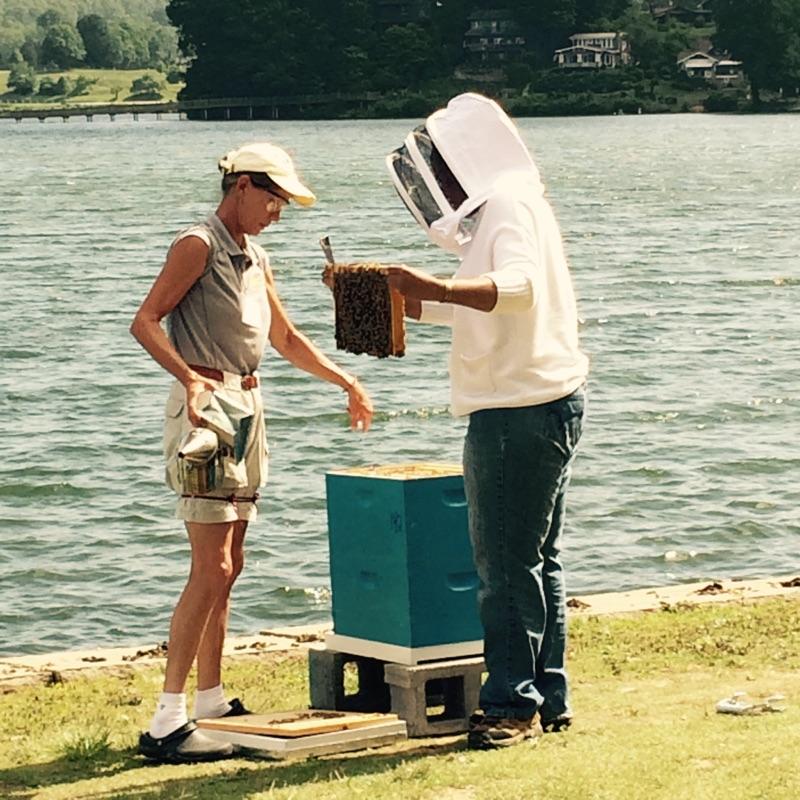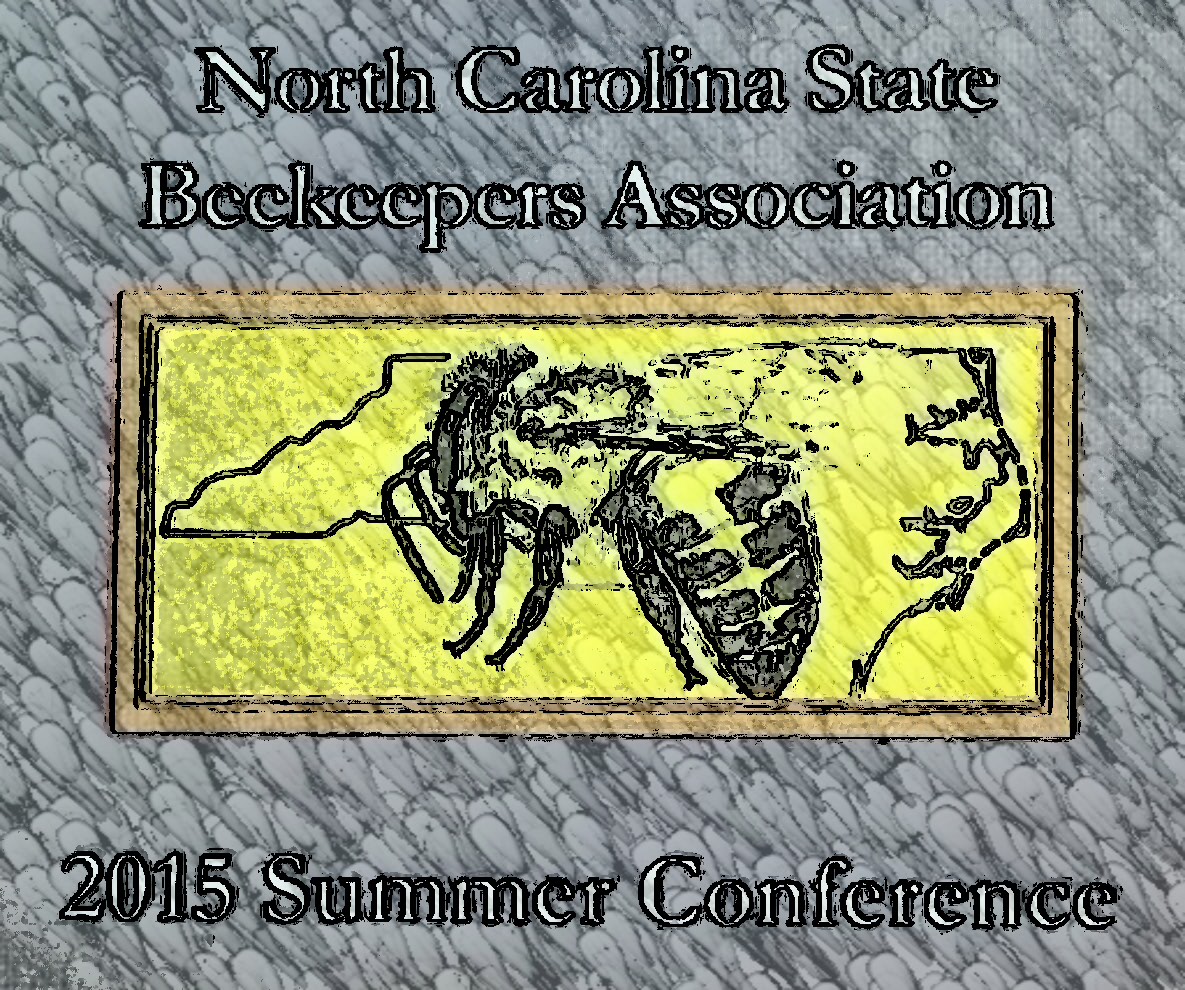 Queen balling… sounds like something straight out of hip-hop. Usurpation court, an insidious plot in Game of Thrones, no but not far from it. Hymenoptera… isn’t that the City of the Dead? Nope. So what do these words all have in common and what do they mean? Well, if you had attended the 2015 North Carolina State Beekeepers Association’s (NCSBA) summer conference you would’ve learned about the complex society and anatomy of bees and the language we use to describe their behaviors (queen balling), actions (usurpation court), and Order (Hymenoptera). Plus, you would have gotten to see TLC’s certified beekeeper (me - now on my way to Journeyman) in action. Thank you to Nancy Ruppert, NC Apiary Inspector for conducting my practical, continued thanks to my bee mentor Liz Lindsey, Master Beekeeper, and much appreciated support from the Durham County Beekeepers Association!
Queen balling… sounds like something straight out of hip-hop. Usurpation court, an insidious plot in Game of Thrones, no but not far from it. Hymenoptera… isn’t that the City of the Dead? Nope. So what do these words all have in common and what do they mean? Well, if you had attended the 2015 North Carolina State Beekeepers Association’s (NCSBA) summer conference you would’ve learned about the complex society and anatomy of bees and the language we use to describe their behaviors (queen balling), actions (usurpation court), and Order (Hymenoptera). Plus, you would have gotten to see TLC’s certified beekeeper (me - now on my way to Journeyman) in action. Thank you to Nancy Ruppert, NC Apiary Inspector for conducting my practical, continued thanks to my bee mentor Liz Lindsey, Master Beekeeper, and much appreciated support from the Durham County Beekeepers Association!  So where am I going with this and what does it have to do with TLC? Short answer… the caring for and rearing of bees and other pollinators, clearly falls within TLC’s mission: it protects wildlife, connects people with nature, and supports local farms and foods. Did you know that 1 out of every 3 bites of food we eat daily can be attributed to pollinators? They are essential to the production of more than 90 crops in the US, and the values of those crops total more than $18.9 billion nationally and $217 billion worldwide according to a Scientific America article published in 2009. Those blueberries we like in pies, ice-cream, cake, scones, cereal, oatmeal etc… 72,000 acres of blueberries across the U.S. require 150,000 colonies of honey bees for pollination per year.
This may lead you to ask the question, what is the current state of pollinators? According to the USDA, Honey Bee overwintering losses in 2013-2014 amounted to a 23.2% loss. You do the math and then factor in the other crops that require pollination (e.g. apples, cucumbers, squash, pumpkin, watermelon, strawberries, peaches, blackberries, and raspberries). The life of a honeybee is a short and intense one, living only 5-6 weeks as an adult before death. God bless the Queen indeed, as she will lay between 1,500 and 2,000 eggs a day during her reign which can last between 2 or more years if not stressed by parasites, diseases, and environmental events. It takes about 50 days to grow a queen and have workers begin to emerge to carry on the hive’s life cycle.
So where am I going with this and what does it have to do with TLC? Short answer… the caring for and rearing of bees and other pollinators, clearly falls within TLC’s mission: it protects wildlife, connects people with nature, and supports local farms and foods. Did you know that 1 out of every 3 bites of food we eat daily can be attributed to pollinators? They are essential to the production of more than 90 crops in the US, and the values of those crops total more than $18.9 billion nationally and $217 billion worldwide according to a Scientific America article published in 2009. Those blueberries we like in pies, ice-cream, cake, scones, cereal, oatmeal etc… 72,000 acres of blueberries across the U.S. require 150,000 colonies of honey bees for pollination per year.
This may lead you to ask the question, what is the current state of pollinators? According to the USDA, Honey Bee overwintering losses in 2013-2014 amounted to a 23.2% loss. You do the math and then factor in the other crops that require pollination (e.g. apples, cucumbers, squash, pumpkin, watermelon, strawberries, peaches, blackberries, and raspberries). The life of a honeybee is a short and intense one, living only 5-6 weeks as an adult before death. God bless the Queen indeed, as she will lay between 1,500 and 2,000 eggs a day during her reign which can last between 2 or more years if not stressed by parasites, diseases, and environmental events. It takes about 50 days to grow a queen and have workers begin to emerge to carry on the hive’s life cycle.

Did you see on our Facebook page that the USFWS Partners for Fish and Wildlife Program, in cooperation with the North Carolina Botanical Garden, is seeking suitable homes for common milkweed plants to benefit monarch butterflies? For this project, participants will be asked to plant 3 to 4 plants in a clump with 4 to 5 clumps per acre. This means that as few as 20 plants can be planted throughout one acre to benefit monarchs. Qualifications for large scale monarch habitat: - Located west of I-95 in North Carolina - Open fields and grasslands currently devoid of milkweed - Willingness to avoid disturbance April – November - Willingness and ability to keep in an early successional state by mowing, burning, or disking - Willingness and ability to plant sites in October 2015 In addition to these types of habitats, consideration will be given to a limited number of small butterfly gardens in which milkweed may be grown for monarchs while also providing an educational site for students or the public. Qualifications for butterfly garden: - Located west of I-95 in North Carolina - Ability to maintain garden - Garden available to students and/or public - Willingness and ability to plant in October 2015 If you qualify and are interested, please send your name and contact information, a detailed property description along with a map, and the number of acres to plant to John Ann Shearer, Partners for Fish and Wildlife Coordinator for North Carolina at johnann_shearer@fws.gov. Please put MILKWEED REQUEST in your subject line. Requests will be prioritized based on the site condition, location, size, degree of protection, ability to be maintained, and other such factors. Planting instructions will be made available and participants will be asked to sign a one page agreement with a map of their site.
